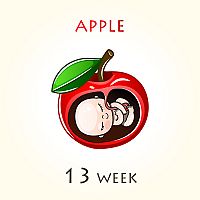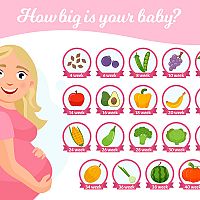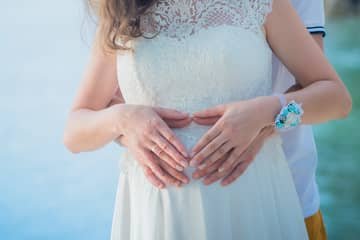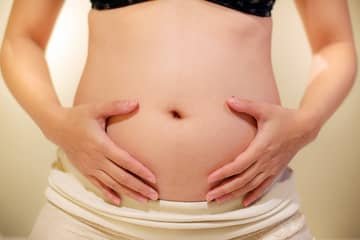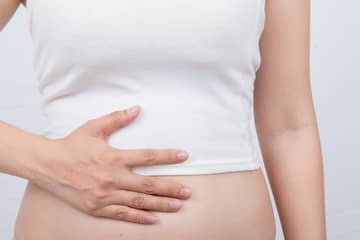
13th week of pregnancy - gender, risks, ultrasound and fetal size
You are at the turn of the first and second trimester. For many women, the last week of the 3rd month is characterized by the fact that several symptoms that they have experienced intensively so far subside. Many women are surprised by the rush of hormones that increase their sexual appetite. However, feelings may vary from person to person. The most important thing is still the development of the fetus. It has grown in size, the limbs are now well mobile, the bones slowly collect calcium and harden. Muscles also develop. The baby actively swallows the amniotic fluid and excretes urine. The fetus also trains breathing by inhaling amniotic fluid. The internal genital organs are almost developed. The gender of the baby can be determined in some cases, other parents will still have to wait. The movements are dynamic, but you won't feel them yet.
The fetus is the size of a peach, most of the organs have already found their place and all the systems continue to develop. The child even purposefully puts his fingers in his mouth. This is how she trains her sucking reflex, which she will need during breastfeeding after childbirth. Women will be pleased that intense nausea should be on the decline. The second trimester is viewed positively by most pregnant women. By the end of the first trimester, you may already feel a rush of energy and an improvement in mood. Even the partner will appreciate it. Don't forget that this very week you may have your first big prenatal screening. How is the baby developing and is the pregnant belly already visible?
Development of the baby in the 13th week of pregnancy
In terms of fetal development, the last week of the first trimester is characterized by the fact that many organs are already functioning and performing their functions. Apart from the organs, all the systems are already formed and the brain has formed neural connections. The head still appears larger compared to the rest of the body. The face already has clear contours, the nose and eyes are in place, the mouth is defined by lips, and the palate with the basis for milk teeth has also been created. During these weeks, the fetus puts its fingers in its mouth and sucks. He thus trains his sucking reflex. It also closes the fists.
The kidneys already produce urine from the amniotic fluid, which the baby swallows and inhales. The liver produces red blood cells and bile. The lungs continue to develop. All the intestines should already be in the abdominal cavity, already managing the digestion of water and glucose. The stomach creates its own environment and contains gastric juices. Bones harden and muscles mature. The limbs are still covered by a thin layer of skin with a minimum of muscle fibers. However, it strengthens the body by moving in the amniotic fluid. The woman does not feel the baby's movements yet.
The placenta also works, which supplies the fetus with the necessary nutrients and oxygen and at the same time removes waste materials. The placenta, like the fetus, grows during pregnancy and adapts to the needs of the fetus. The volume of amniotic fluid also increased to approximately 100-200 ml. Hair follicles (so-called lanugo) begin to form.
13th week of pregnancy - ultrasound and the gender of the baby
On ultrasound, the fetus will be the size of a larger plum or peach. CRL – crown-coccyx length from crown to coccyx should be around 68 to 82 mm. The fetus can weigh up to approximately 30 g. As part of the pregnancy consultation, you are expected to visit at least once every 4 to 6 weeks, unless the doctor decides otherwise. The goal is to monitor the condition of the fetus and your health. Blood and urine are regularly examined, blood pressure is measured, weight gain is monitored and control ultrasound is performed. A laboratory blood test is necessary regularly in order to monitor the antibodies in the blood if the woman has a negative Rh factor. The doctor will also recommend a visit to the dentist, or may recommend a visit to other specialists, if there is an indication for it.
If you have not yet completed the first trimester screening, a complete set of examinations and tests awaits you. Sampling of blood, urine (note monitoring of the level of protein in the urine due to the occurrence of preeclampsia), measurement of blood pressure, weight, height, monitoring of pregnancy symptoms. The doctor will also be interested in family history, past illnesses, present allergies and other knowledge, including your feelings. The possible presence of congenital developmental diseases is also determined from the blood. A thorough ultrasound examination of the fetus is a matter of course, including measuring the CRL, listening to the heartbeat and monitoring possible deviations. It is also possible to undergo commercial medical tests (note: they are not reimbursed by the health insurance company, e.g. NIPT test), which will be presented to you by a doctor.
Will I already know the gender of the baby in the 13th week of pregnancy? Is it a boy or a girl? The ovaries (girl) and testicles (boy) are already maturing inside the fetus, but only the genital bump is visible on the outside, the direction of which can indicate the sex of the baby. Already the internal testicles are producing testosterone and the ovaries contain millions of eggs. However, the doctor will definitely not tell you the gender during the ultrasound examination. Exceptionally, it is sometimes possible to recognize in the 13th week whether it is really a girl or a boy. It also depends on the experience of the gynecologist.
13th week of pregnancy - symptoms
In the 13th week of pregnancy, the pregnant belly can peek out. However, it may not necessarily appear this week. The growing uterus may begin to form a slight arch. A lot depends on body type, weight, etc. The pregnancy belly effect can also cause bloating - slowed digestion. This can cause pain in the lower abdomen in the 13th week of pregnancy. Lower abdominal pain can also be caused by the stretching of the ligaments of the growing uterus. You may have already noticed an increase in weight, even if it may only be a few hundred grams. It depends on the intensity of the nausea you experienced in the previous period.
Among the symptoms are growing breasts, which are considerably larger, but also more painful, during the transition to the second trimester. Visible veins are evidence of blood flow. Milk begins to form in the breasts around the 16th week. Morning sickness should be on the wane. The uterus moves higher and the urge to urinate could also recede. The transition between the first and second trimester can still cause dizziness and indigestion, but during the second trimester many of these symptoms should disappear.
Several symptoms, even if they appear, are less intense. The woman notices an improvement in her mood and also has more energy. Pregnancy beauty is not a myth, your skin is more bloodstained, it is taut, your hair is thicker, shinier and does not fall out. Nails are healthier and overall, women are said to glow during pregnancy. Of course, if they are not currently suffering from dizziness and nausea.
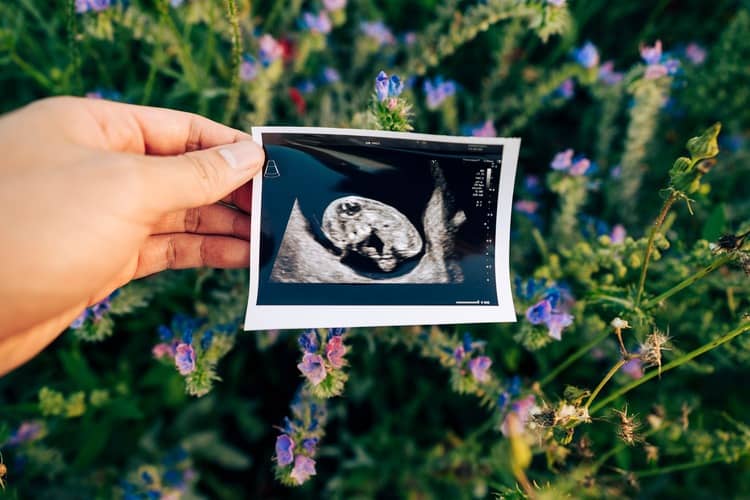
The stretch marks come and the discharge from the vagina remains
Many women have to come to terms with the fact that stretch marks can appear on the hips, buttocks, thighs or breasts, which are caused by the rapid enlargement of the given area. In some women, stretch marks are more visible, in others less. After childbirth, most of the stretch marks fade, but they remain in some places. In addition to stretch marks, pigment spots also appear, the so-called pregnancy mask on the face or hands.
More frequent complications are urinary tract infections or emerging vaginal inflammations, which are manifested by itching or burning. It is necessary to treat these inflammations, because they can endanger the fetus. Vaginal discharge in this case is lumpy and has a stronger smell. It should not be confused with persistent discharge from the vagina, the so-called leucorrhoea. It is a clear, milky, odorless discharge that accumulates in the cervix and creates a kind of barrier against the entry of bacteria into the uterus.
We recommend increasing your immunity not only by eating a balanced diet, but also by taking suitable vitamins for pregnant women. Visit the dentist if you feel painful or bleeding gums. You may be surprised by leg cramps or slight swelling, which you should inform your doctor about.
Sex in the 13th week of pregnancy - increased libido
The first weeks of pregnancy for many women revolved around nausea, fear and uncertainty about pregnancy and possible complications, intimate life with a partner was also forgotten. Towards the end of the first trimester, however, many symptoms disappeared and the desire for sex appeared, higher than before? Maybe you and your partner have just now experienced the feeling that the orgasm during pregnancy is much more intense and easier to achieve and you experience a much greater desire for sexual activity. The desire for sex is higher in many women during this period, which is due to hormonal changes. Sex during pregnancy is completely safe. The risk arises only if it is a high-risk pregnancy or there is an infection and the like. In that case, doctors do not recommend sexual intercourse.
Expectant mothers are often frightened by spotting or traces of blood immediately after intercourse or the next day. Spotting after sex is completely natural, as the cervix is much more sensitive and may be slightly irritated. However, it is definitely not a serious problem.
13th week of pregnancy - experiences
Discussants in forums and discussions are primarily interested in how other mothers are/have experienced the 13th week of pregnancy. Most women emphasize that there has been a retreat of terrible symptoms and nausea. Some reported that several symptoms remained, such as excessive salivation or pain in the lower abdomen. Many women confuse bowel movements with baby movements. In the 13th week of pregnancy, it is very unlikely that the mother-to-be could feel the movements of such a small fetus. The women also dealt with the pregnancy belly, which had not yet appeared, which is completely normal, especially for first-time mothers. It is very individual. For some women, the belly peeks out from the 13th week, for others, the pregnant belly begins to grow around the 20th week.
The most frequent questions - FAQ
Do you notice other symptoms in yourself in the 13th week of pregnancy? Have you noticed, on the contrary, that several symptoms of pregnancy subside? Have you already had a pregnant belly? Did you pass the first prenatal screening? What feelings did you have or have at the turn of the first and second trimester of pregnancy? We are interested in your opinion. The practical experiences of mothers who have gone through pregnancy are very valuable to us. Your advice, recommendations and knowledge can be very beneficial for many expectant mothers. Join the discussion under the article and without registration you can express your opinion or ask what interests you.
What is the size of the fetus in the 13th week of pregnancy?
13th week of pregnancy, what month is it?
What are the risks in the 13th week of pregnancy?
Gallery
Pridať komentár


